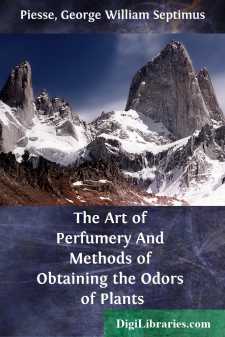Categories
- Antiques & Collectibles 13
- Architecture 36
- Art 48
- Bibles 22
- Biography & Autobiography 813
- Body, Mind & Spirit 142
- Business & Economics 28
- Children's Books 17
- Children's Fiction 14
- Computers 4
- Cooking 94
- Crafts & Hobbies 4
- Drama 346
- Education 46
- Family & Relationships 57
- Fiction 11829
- Games 19
- Gardening 17
- Health & Fitness 34
- History 1377
- House & Home 1
- Humor 147
- Juvenile Fiction 1873
- Juvenile Nonfiction 202
- Language Arts & Disciplines 88
- Law 16
- Literary Collections 686
- Literary Criticism 179
- Mathematics 13
- Medical 41
- Music 40
- Nature 179
- Non-Classifiable 1768
- Performing Arts 7
- Periodicals 1453
- Philosophy 64
- Photography 2
- Poetry 896
- Political Science 203
- Psychology 42
- Reference 154
- Religion 513
- Science 126
- Self-Help 84
- Social Science 81
- Sports & Recreation 34
- Study Aids 3
- Technology & Engineering 59
- Transportation 23
- Travel 463
- True Crime 29
The Art of Perfumery And Methods of Obtaining the Odors of Plants
Categories:
Description:
Excerpt
SECTION I.
"By Nature's swift and secret working handThe garden glows, and fills the liberal air
With lavish odors.
There let me draw
Ethereal soul, there drink reviving gales,
Profusely breathing from the spicy groves
And vales of fragrance."—Thomson.
Among the numerous gratifications derived from the cultivation of flowers, that of rearing them for the sake of their perfumes stands pre-eminent. It is proved from the oldest records, that perfumes have been in use from the earliest periods. The origin of this, like that of many other arts, is lost in the depth of its antiquity; though it had its rise, no doubt, in religious observances. Among the nations of antiquity, an offering of perfumes was regarded as a token of the most profound respect and homage. Incense, or Frankincense, which exudes by incision and dries as a gum, from Arbor-thurifera, was formerly burnt in the temples of all religions, in honor of the divinities that were there adored. Many of the primitive Christians were put to death because they would not offer incense to idols.
"Of the use of these luxuries by the Greeks, and afterwards by the Romans, Pliny and Seneca gives much information respecting perfume drugs, the method of collecting them, and the prices at which they sold. Oils and powder perfumery were most lavishly used, for even three times a day did some of the luxurious people anoint and scent themselves, carrying their precious perfumes with them to the baths in costly and elegant boxes called Narthecia."
In the Romish Church incense is used in many ceremonies, and particularly at the solemn funerals of the hierarchy, and other personages of exalted rank.
Pliny makes a note of the tree from which frankincense is procured, and certain passages in his works indicate that dried flowers were used in his time by way of perfume, and that they were, as now, mixed with spices, a compound which the modern perfumer calls pot-pourri, used for scenting apartments, and generally placed in some ornamental Vase.
It was not uncommon among the Egyptian ladies to carry about the person a little pouch of odoriferous gums, as is the case to the present day among the Chinese, and to wear beads made of scented wood. The "bdellium" mentioned by Moses in Genesis is a perfuming gum, resembling frankincense, if not identical with it.
Several passages in Exodus prove the use of perfumes at a very early period among the Hebrews. In the thirtieth chapter of Exodus the Lord said unto Moses: "1. And thou shalt make an altar to burn incense upon; of Shittim wood shalt thou make it." "7. And Aaron shall burn thereon sweet incense every morning; when he dresseth the lamps he shall burn incense upon it." "34. Take unto thee sweet spices, stacte, and onycha, and galbanum; these sweet spices with pure frankincense: of each shall there be a like weight." "35. And thou shalt make it a perfume, a confection after the art of the apothecary, tempered together pure and holy." "36. And thou shalt beat some of it very small, and put of it before the testimony in the tabernacle of the congregation, where I will meet with thee; it shall be unto you most holy." "37....


